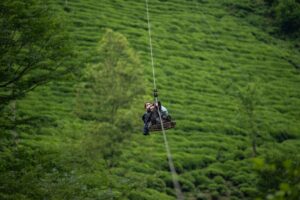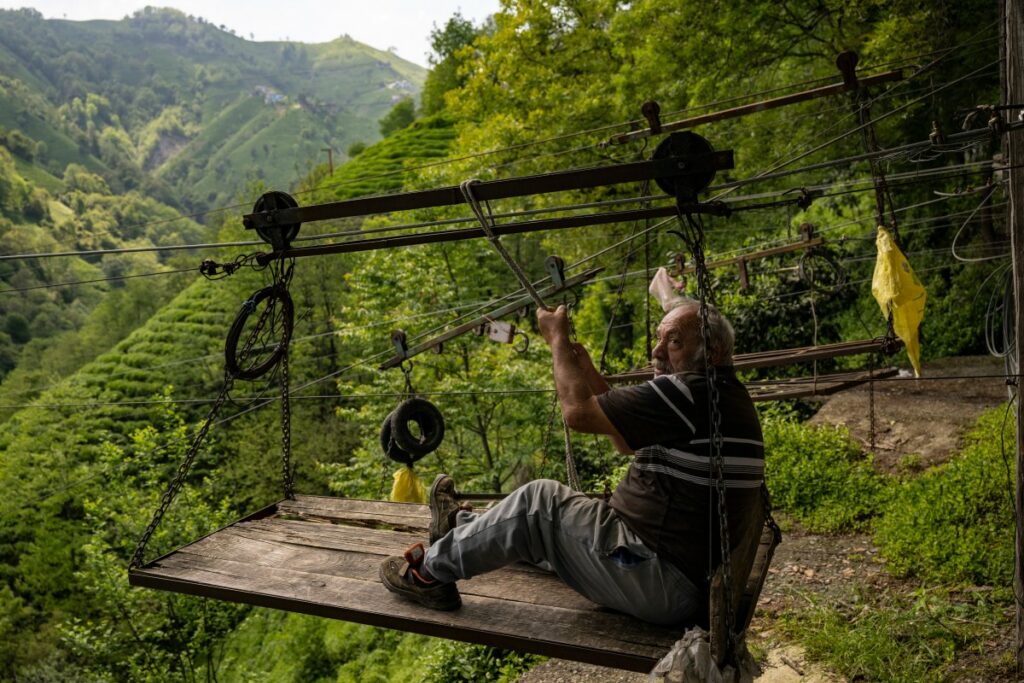You need to be part daredevil to live in the spectacularly steep hills overlooking the Black Sea where Turkey grows its tea.

To get to his home, 90-year-old Kasım Karaosman has to hoist himself into a rickety cable car contraption that shoots him 300 meters across a deep mountain valley on his back.
Only a couple of planks separate him from the gorge and tea gardens far below.

“You must not look down,” warned Karaosman, who built the rough and ready mechanism himself more than 50 years ago.
Many of his neighbors in tea-growing villages above the coastal city of Rize in northeast Turkey make similarly perilous trips to and from their precipitous fields every day in thousands of primitive gondolas.
But a string of deaths and hair-raising accidents has sent a shudder of fear through the deep green mountainsides where every inch of farmable land, no matter how steep, has been given over to tea.
“I no longer ride on it myself. I’ve had too many accidents,” Sevilay Şen told AFP as she unloaded bales of freshly cut tea from a swaying gondola near the village of Dağınıksu.
In April two of her neighbors fell 20 meters (65 feet) after being caught in a gust of wind, cheating death by a whisker.
Despite the tough climb, Şen and her husband now prefer to clamber up from their fields to the road.
‘I’m scared’
“By the grace of Allah they will walk again one day,” said Hasan Uzun, the husband of one of the victims, the anger in his voice clear.
“I only use them when I have no choice,” said Ercan Çalık, perched on a ridge, with tea plantations stretching as far as the eye can see.
“Without the cable cars, there would be no life here,” the 50-year-old farmer said, fingering his prayer beads as he surveyed a slope that yields hundreds of tons of tea every year.
The makeshift machines are essential for locals harvesting fields in steep valleys inaccessible by car or tractor.
But journeys on the gondolas — made from planks nailed to a metal frame hanging from a steel cable — are risky, with no barriers or railings to stop people falling.
The accident in April has panicked many locals in Dağınıksu, where nearly every household makes their living from tea, selling their crop on to behemoths like the Turkish state-owned company Çaykur.
“I no longer ride on my cable car since the accident. I’m scared,” said Hürmet Yıldırım, 64, her hair covered in a black veil.
“Our lives are at risk,” the farmer added.
Homemade contraptions
Rize’s Chamber of Mechanical Engineers estimates there are around 15,000 such cable cars across the mountainous Black Sea region.
It said 18 people were killed on the cable cars and several hundred injured between 2008 and 2021.
Since then at least two people from Rize and neighboring Trabzon province have died in similar accidents, including a 25-year-old man electrocuted in July last year after boarding a gondola laden with tea.
Two local forensic scientists who published a study in 2021 of eight fatal cable car accidents found that “since there is no license for primitive cable cars, there are no official tests” to ensure they are well maintained.
Back in nearby Selamet village, Kasım Karaosman slowly climbed up into his gondola with his shopping.
With no road to his house high on a ridge, he has no choice but to take his life in his hands in his homemade contraption.
Yet despite the risk, Karaosman has no plans to leave his clifftop home. “From here I can see the snowy mountaintops” of the Pontic Alps, he said.
© Agence France-Presse

